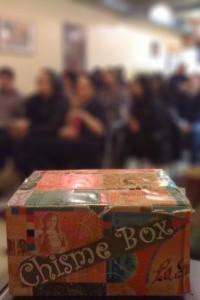Poet Kelly Norman Ellis, author of Tougaloo Blues and longtime P&W-supported writer and presenter of literary events, spotlights Chicago's Proyecto Latina and its famed Chisme Box.
One of the blessings of living and working in Chicago is the great ethnic and racial diversity. I am often humbled at the hard work of community arts organizations in my city and their commitment to representing this great diversity. These organizations bring quality art to the people for little or no charge and are essential relationships in building a literary community outside the boundaries of college classrooms and MFA programs. Because CSU is a university serving mostly black and brown people, the importance of coalition building is critical to exposing these people to the work of writers who live and work in these communities of color. One such organization is Proyecto Latina.
 Proyecto Latina is a multimedia project that amplifies the success and impact of Latinas by sponsoring a reading series and a website that allows women to create a culture of self-empowerment, spotlight emerging and established Latina talent, create safe spaces in underserved communities, provide a virtual platform to chronicle stories, share resources, and start dialogue.
Proyecto Latina is a multimedia project that amplifies the success and impact of Latinas by sponsoring a reading series and a website that allows women to create a culture of self-empowerment, spotlight emerging and established Latina talent, create safe spaces in underserved communities, provide a virtual platform to chronicle stories, share resources, and start dialogue.
The third Monday of every month Proyecto celebrates the creativity of a
Latina artist. The roster of writers is very impressive. Writers such as
Xanath Caraza, Yolanda Nieves, Awilda Lupe Gonzalez have all graced the
Proyecto Latina mike. The website includes advice for emerging writers, interviews with established writers, and information about the work of Latina writers in the Chicago community and abroad.
Also on the Proyecto Latina website is a photograph of the Chisme Box (Chisme means "gossip" in Spanish). It’s described as “a regular at our monthly readings and she loves to interact with everyone. She loves the buzz of a crowded room and has the bad habit of eavesdropping on everyone, but rest assured she can keep a secret. Despite her name she prefers funny confessionals to mean-spirited gossip and is unapologetic about spitting out deposits that don’t sit well with her." The Chisme Box is a way to share stories, information, wisdom, truth. As our writing program grows at CSU, I will be reminded of the Proyecto Latina’s Chisme Box and the ways artist make worlds whereever we go.
Support for Readings/Workshops events in Chicago is provided by an endowment established with generous contributions from Poets & Writers Board of Directors and others. Additional support comes from the Friends of Poets & Writers.





 One of the Guild’s strengths is its commitment to dialogue between artists of different backgrounds and sensibilities. My most recent experience with the Guild was with the
One of the Guild’s strengths is its commitment to dialogue between artists of different backgrounds and sensibilities. My most recent experience with the Guild was with the 